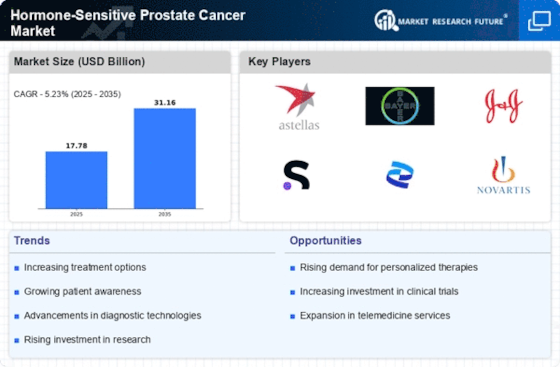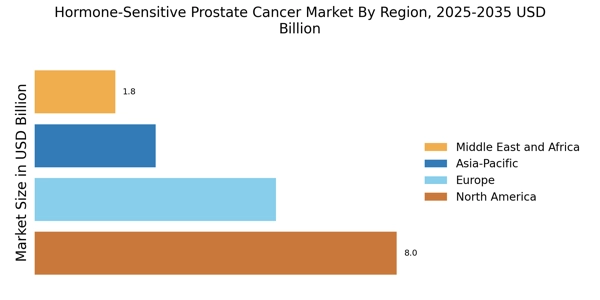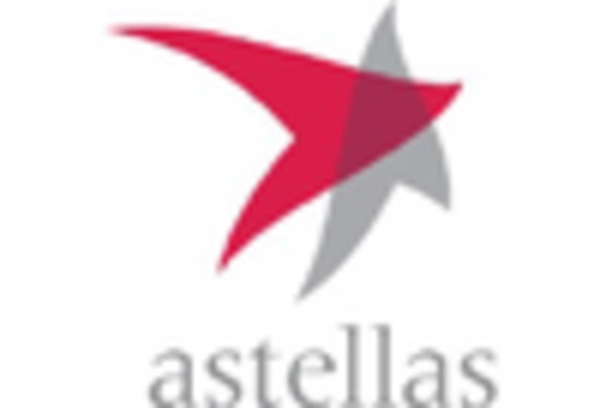Increased Research Funding
The surge in research funding for prostate cancer is a notable driver of the Hormone-Sensitive Prostate Cancer Market. Governments and private organizations are increasingly allocating resources to study the biology of prostate cancer and develop innovative treatment strategies. This influx of funding is likely to accelerate the pace of clinical trials and the introduction of new therapies into the market. Enhanced research efforts may also lead to breakthroughs in understanding hormone-sensitive mechanisms, which could result in more effective treatment options. As a consequence, the Hormone-Sensitive Prostate Cancer Market is poised for growth, driven by these research initiatives.
Growing Geriatric Population
The aging population is a crucial factor driving the Hormone-Sensitive Prostate Cancer Market. As men age, the risk of developing prostate cancer increases, with the majority of cases diagnosed in men over the age of 65. This demographic shift is expected to lead to a higher prevalence of hormone-sensitive prostate cancer, thereby increasing the demand for effective treatment options. According to demographic projections, the number of individuals aged 65 and older is anticipated to double by 2050, which could significantly impact the market dynamics. Healthcare systems may need to adapt to accommodate this growing patient base, further stimulating the Hormone-Sensitive Prostate Cancer Market.
Rising Awareness and Education
The growing awareness and education surrounding prostate cancer are pivotal in shaping the Hormone-Sensitive Prostate Cancer Market. Campaigns aimed at educating the public about the risks and symptoms of prostate cancer are becoming more prevalent, leading to earlier detection and treatment. Increased awareness may also encourage men to seek regular screenings, which can result in a higher diagnosis rate of hormone-sensitive cases. Furthermore, healthcare providers are emphasizing the importance of discussing treatment options with patients, which could lead to a greater acceptance of hormone therapies. This heightened awareness is likely to contribute positively to the growth of the Hormone-Sensitive Prostate Cancer Market.
Rising Incidence of Prostate Cancer
The increasing incidence of prostate cancer is a primary driver for the Hormone-Sensitive Prostate Cancer Market. Statistics indicate that prostate cancer is one of the most prevalent cancers among men, with an estimated 1.4 million new cases diagnosed annually. This rising trend necessitates the development and availability of effective treatment options, particularly for hormone-sensitive cases. As awareness grows and screening practices improve, more individuals are being diagnosed at earlier stages, which may lead to a higher demand for hormone therapies. Consequently, pharmaceutical companies are likely to invest in research and development to address this growing patient population, thereby propelling the Hormone-Sensitive Prostate Cancer Market forward.
Advancements in Treatment Modalities
Innovations in treatment modalities are significantly influencing the Hormone-Sensitive Prostate Cancer Market. Recent advancements in hormone therapies, including androgen receptor inhibitors and novel anti-androgens, have shown promising results in clinical trials. These therapies are designed to target hormone-sensitive cancer cells more effectively, potentially improving patient outcomes. The market is witnessing a shift towards personalized medicine, where treatments are tailored to individual patient profiles. This trend is expected to enhance the efficacy of therapies and may lead to increased adoption rates among healthcare providers. As a result, the Hormone-Sensitive Prostate Cancer Market is likely to experience substantial growth driven by these advancements.

















